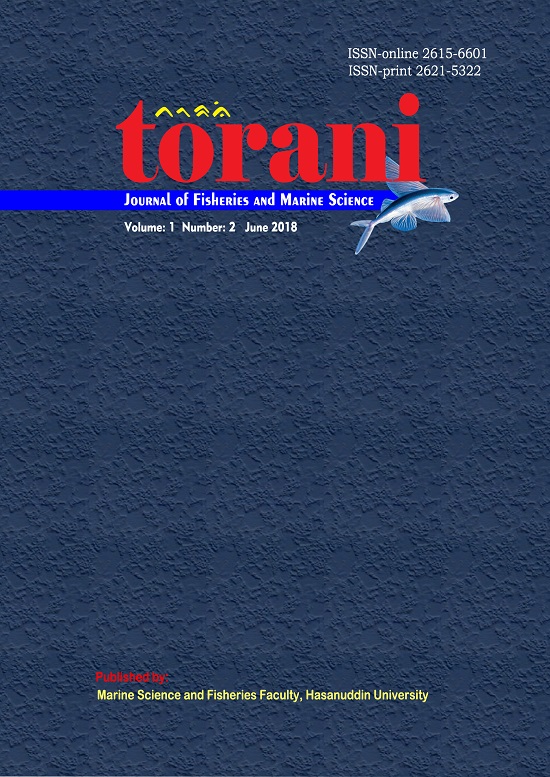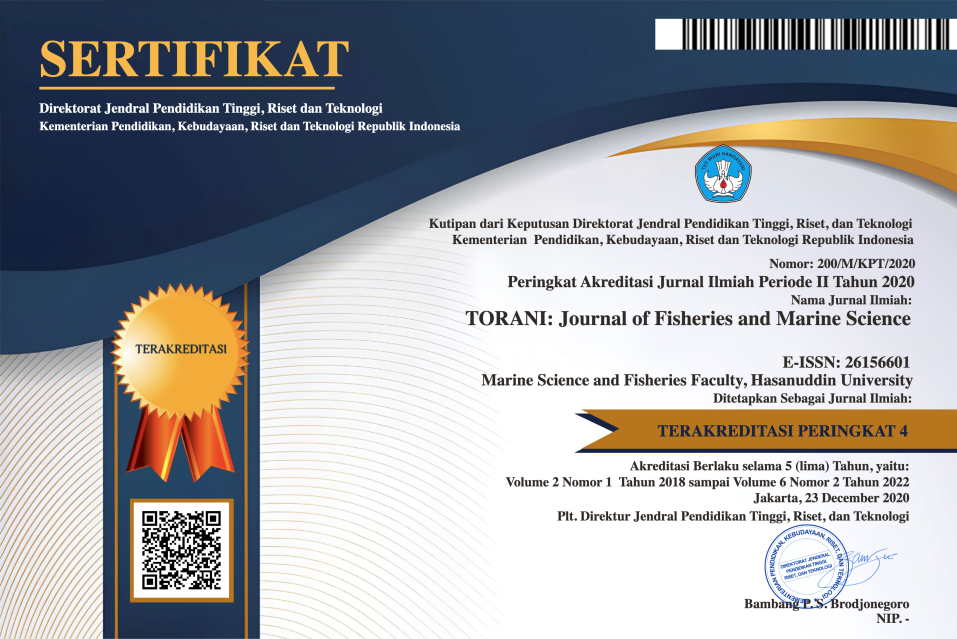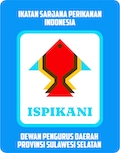Portrait of Hatchery Management Profile on Rainbow Fish Melanotaenia boesemani (Allen & Cross, 1980) Cultivation in Jakarta Area
DOI:
https://doi.org/10.35911/torani.v1i2.4484Abstract
Hatchery managers and maintaining genetic diversity and fitness population in endangered and threatened species in pond is a important and difficult thing to do. But is must to do for conservation biology. Fitness and structure population depends on effective breeding number (Ne) and population connectivity between each other. The second most important thing is gene flow and genetic drift. Ne is major role in the maintenance of genetic diversity as indicator for inbreeding depresion and genetic drift. We sampled 6 hatchery in Jakarta and Bekasi Indonesia region and used 12 polymorphic microsatellite loci to quantify population genetic structure. Result in this study are, each farm have different methode. The old farmers is bapak Gusi and bapak Hasan (+30 years). Ne in bapak Hasan and bapak Gusi hatchery is 66,667 and F value is 0,00749 and loosing allele (P) is 0,26183. Compared with younger farmers bapak Yahya (5 years) have Ne = 133,333, F = 0,00375 and P = 0,06855. Even though hatchery bapak Hasan and bapak Gusi have the same value Ne, F and P but the result in population structure they are different founder populations. Hatchery bapak Hasan have unique structure and alleles composition compared with other hatchery.Keywords: breeding, management, Melanotaenia boesemani, hatchery, population.Downloads
References
Allen GR, Cross NJ. (1980). Descriptions of five new rainbowfish (Melanotaeniidae) from New Guinea, Rec. West Aust. Mus.8(3):377-396.
Allendrof FW. 1993. Delay of Adaptation to Captive Breeding by Equalizing Family Size. Conservation Biology. 7(2):416-419.
Andersen LW, Fog K, Damgaard C. 2004. Habitat fragmentation causes bottlenecks and inbreeding in the european tree frog (Hyla arborea). Proc R Soc Lond B.271:1293-1302.
Angfa. 2011. Rainbowfishe Their Care & Keeping in Captivity. Second Edition.
Belkhir K, Borsa P, Chikhi L, Raufaste N, Bonhomme F. 1996. GENETIX 4.05, logiciel sous WindowsTM pour la génétique des populations, CNRS, Laboratoire génome, populations, interactions, Montpellier, France.
Crnokrak P, Roff DA. 1999. Inbreeding depression in the wild heredity. 83:260-270.
Philippart JC. 1995. Is captive breeding an effective solution for the preservation of endemic species. Biological conservation.72:281-295.
Smith HP, Jones R, Kailola P. 2007. FINAL REPORT. Scientific review of the biosecurity risks associated with the importation of rainbowfish for ornamental purposes. Panaquatic® Health Solutions Pty Ltd, pp 101.
IUCN. (2013). IUCN Red List of Threatened Species [internet]. [diacu 2013 Agustus 1]. Tersedia dari, www.iucnredlist.org
Kadarusman. 2012. Rainbowfishes from West Papua (Melanotaeniidae): Evolution and Systematics. These Doctorat de l’Universite de Toulouse France , pp 161.
Nugraha MFI, Pouyaud L, Carman O, Kadarusman, Widyastuti U, Avarre JC. 2014. Development of twelve novel polymorphic microsatellite DNA markas for the Boeseman's rainbowfish (Melanotaenia boesemani) and test for their cross-utility in 21 rainbowfish species from West Papua (Indonesia). European Journal Wild Life Research. 60:941-946. doi: 10. 1007/s10344-014-0868-2.
Nugraha MFI, Pouyaud L, Carman O, Widyastuti U, Junior MZ, Kadarusman, Avarre JC. 2015. Genetic diversity of Boeseman’s rainbowfish Melanotaenia boesemani reared in Indonesian farms compared to endangered natural population. Tropical Conservation Science. 8(3):796-805.
Ouborg NJ, Pertoldi C, Loeschcke V, Bijlsma RK, Hedrick PW. 2010. Conservation genetics in transition to conservation genomics. Trends in Genetics. 26 (4):177-187. doi:10.1016/j.tig.2010.01.001.
Pritchard JK, Stephens M, Donnelly P. 2000. Inference of population structure using multilocus genotype data. Genetics. 155:945-959.
Schwartz M, Luikart G, Waples R. (2007). Genetic monitoring as a promissing tool for conservation and management. Trends Ecol Evo. 22:25-33.
Tave D. 1986. Genetics for fish hatchery managers. Avi publishing company, Inc. Westport, Connecticut, 113 - 227
Van Oosterhout C, Hutchinson WF, Wills DPM, Shipley P. (2004). Micro-Checker: software for identifying and correcting genotyping errors in microsatellite data. Mol Ecol Note. 4: 535-538m.



















